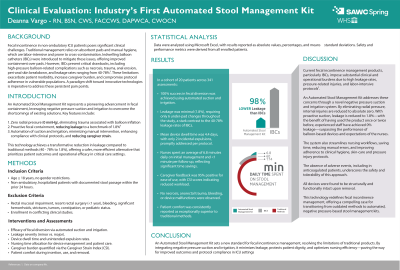Practice Innovations
(PI-047) Revolutionizing Fecal Care with Automation: Enhanced Containment, Reduced Infections, and Improved Patient Care

This study introduces the Automated Stool Management Kit, an innovative technology designed to enhance fecal containment in critical care units. Traditional methods often fail to manage fecal incontinence, leading to pressure injuries and infections. They have leakage rates of 40-78%, which the kit reduces to just 1.8%. Kit represents a breakthrough in patient care, offering a more reliable, efficient solution.
Methods:
Patient Eligibility: Bedridden adults with at least one liquid stool incontinence within 24 hours before device use. Patients on oral anti-coagulation therapy or with recent cardiac arrest were included at care provider's discretion. Patients with suspected or confirmed rectal abnormalities were excluded.
Interventions and Assessments: Patients used absorbent pads with the device in place, monitored every 8 hours. The perineal area was checked for complications. Assessments focused on successful fecal diversion, leakage rates, duration of use, nursing time, caregiver strain reduction, patient comfort, accidental expulsion, device removal due to inefficacy.
Statistical Analysis: Data were analyzed using Microsoft Excel, presenting results as absolute values, percentages, with mean ± standard deviation.
Results:
20 patients were evaluated. At device insertion, 40% had stool consistency at Bristol Scale 7. Devices were successfully deployed, with 95% of care providers reporting ease of insertion.
Among 341 assessments, no leakage was observed in 323 instances (94.72%), minor leakage in 12 (3.5%), major leakage in 6 (1.8%). Only 6 under pads were changed due to soiling. In 87 days of collective use, the device accidentally expelled twice but was reinserted. Nurses spent an average of 6.8 minutes daily and 0.4 minutes per follow-up. The device remained in place for an average of 4.4 days. No anorectal bleeding observed.
Discussion:
The innovative Automated Stool Management Kit addresses the issues of balloon catheters, which have leakage rates of 40-78%, by reducing these rates to just 1.8%. Once nurses are proficient, leakage rates at large health systems drop to 0%. The kit improves fecal incontinence management, reduces pressure injuries and infections, and is validated for safety, efficacy, and user-friendliness with no adverse events. It's well-tolerated by patients on anticoagulant therapy, enhances patient care, operational efficiency in critical care settings.

.jpg)